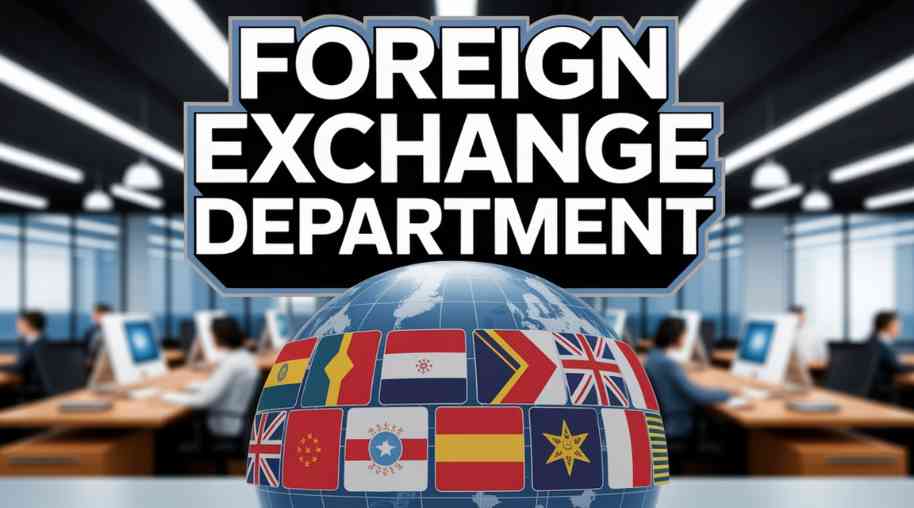FED Full Form-Foreign Exchange Department
by Shashi Gaherwar
0 2322
Foreign Exchange Department: Functions, Role, and Importance in Global Trade
Inroduction
The Foreign Exchange Department (Forex Department) plays a crucial role in managing a country's foreign currency transactions, ensuring smooth international trade and investment. It operates under financial institutions, banks, and central banks, regulating currency exchange, forex reserves, and foreign trade settlements. This department ensures the stability of a nation’s economy by managing foreign exchange rates, monetary policies, and capital flows.

What is the Foreign Exchange Department?
The Foreign Exchange Department is a specialized unit within banks and financial institutions responsible for:
- Managing Currency Exchange Transactions: Handling buying and selling of foreign currencies.
- Regulating Foreign Trade Payments: Facilitating import and export payments.
- Controlling Forex Reserves: Maintaining adequate foreign currency reserves.
- Monitoring Exchange Rate Fluctuations: Tracking changes in currency values.
Key Functions of the Foreign Exchange Department
- Currency Exchange Management:
- Facilitates buying and selling of foreign currencies.
- Ensures compliance with forex regulations.
- Provides currency conversion services for international trade.
- Foreign Trade Facilitation:
- Processes import and export payments.
- Issues letters of credit (LCs) and bank guarantees.
- Ensures swift and secure international transactions.
- Forex Reserve Management:
- Maintains adequate foreign currency reserves.
- Helps in stabilizing exchange rates.
- Ensures liquidity for international payments.
- Regulation and Compliance:
- Implements central bank policies on forex.
- Ensures adherence to anti-money laundering (AML) laws.
- Prevents illegal forex transactions.
- Exchange Rate Monitoring:
- Tracks market fluctuations in currency values.
- Helps businesses and governments in hedging currency risks.
- Implements measures to stabilize the forex market.
- Foreign Investment Management:
- Facilitates Foreign Direct Investment (FDI) inflows and outflows.
- Manages foreign portfolio investments (FPI).
- Assists multinational corporations in capital movement across countries.
Importance of the Foreign Exchange Department
- Stabilizing Currency Values:
- Prevents extreme fluctuations in exchange rates.
- Ensures a stable economic environment for businesses.
- Enhancing International Trade:
- Facilitates seamless global trade transactions.
- Reduces risks associated with currency fluctuations.
- Managing Inflation and Interest Rates:
- Controls money supply in the economy.
- Influences interest rate decisions by central banks.
- Encouraging Foreign Investments:
- Builds confidence among foreign investors.
- Ensures safe and regulated capital inflows and outflows.
- Hedging Against Currency Risks:
- Provides businesses with hedging instruments (forward contracts, options, swaps).
- Protects companies from currency value fluctuations.
How Does the Foreign Exchange Department Work?
- Monitoring the Forex Market:
- Analyzes currency value trends.
- Implements monetary policies to maintain stability.
- Facilitating Forex Transactions:
- Processes forex trades for businesses and individuals.
- Enables cross-border fund transfers.
- Managing Foreign Reserves:
- Ensures adequate forex reserves for economic stability.
- Uses reserves to control currency fluctuations.
- Implementing Central Bank Directives:
- Follows policy changes set by central banks.
- Regulates foreign exchange rates.
Challenges Faced by Foreign Exchange Departments
- Currency Volatility: Frequent changes in exchange rates can impact trade.
- Regulatory Restrictions: Governments impose forex controls affecting liquidity.
- Global Economic Shocks: Events like recessions and geopolitical tensions influence forex markets.
- Risk of Fraud: Unregulated forex trading can lead to money laundering and illegal transactions.
The Foreign Exchange Department plays a vital role in a country’s economic framework by ensuring efficient currency management, stabilizing exchange rates, and supporting global trade. By regulating forex reserves and monitoring exchange rates, it helps businesses, investors, and policymakers make informed financial decisions. A well-functioning foreign exchange system is essential for sustainable economic growth and financial stability.
Further Learning Resources
If you’re passionate about building a successful blogging website, check out this helpful guide at Coding Tag – How to Start a Successful Blog. It offers practical steps and expert tips to kickstart your blogging journey!
For dedicated UPSC exam preparation, we highly recommend visiting www.iasmania.com. It offers well-structured resources, current affairs, and subject-wise notes tailored specifically for aspirants. Start your journey today!

Share:









Comments
Waiting for your comments